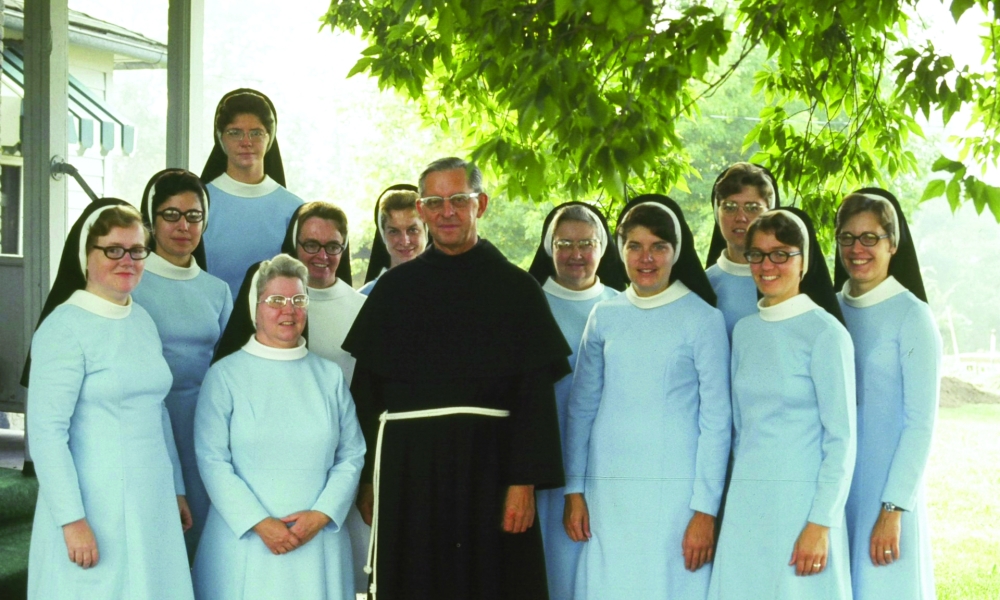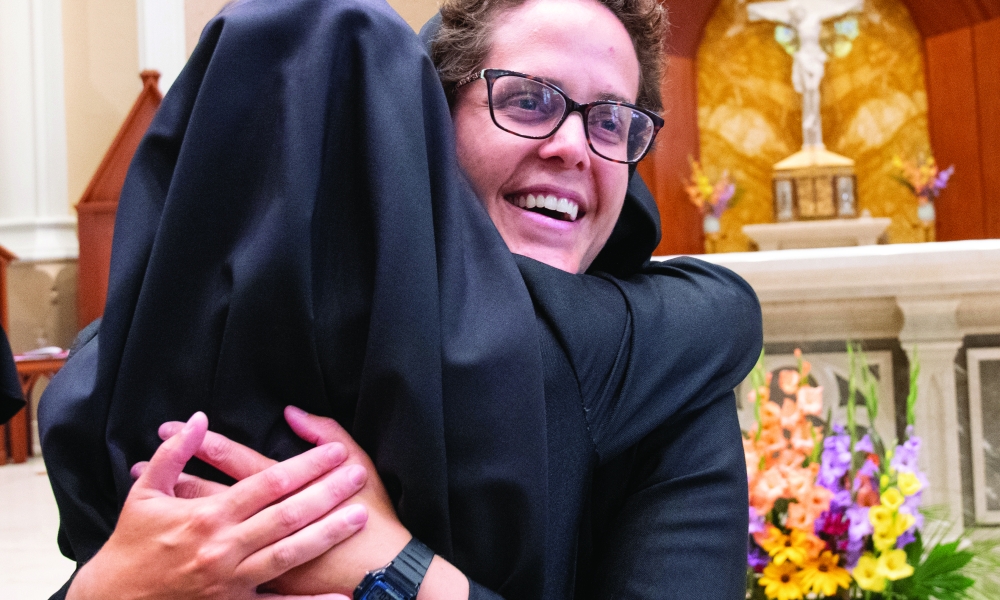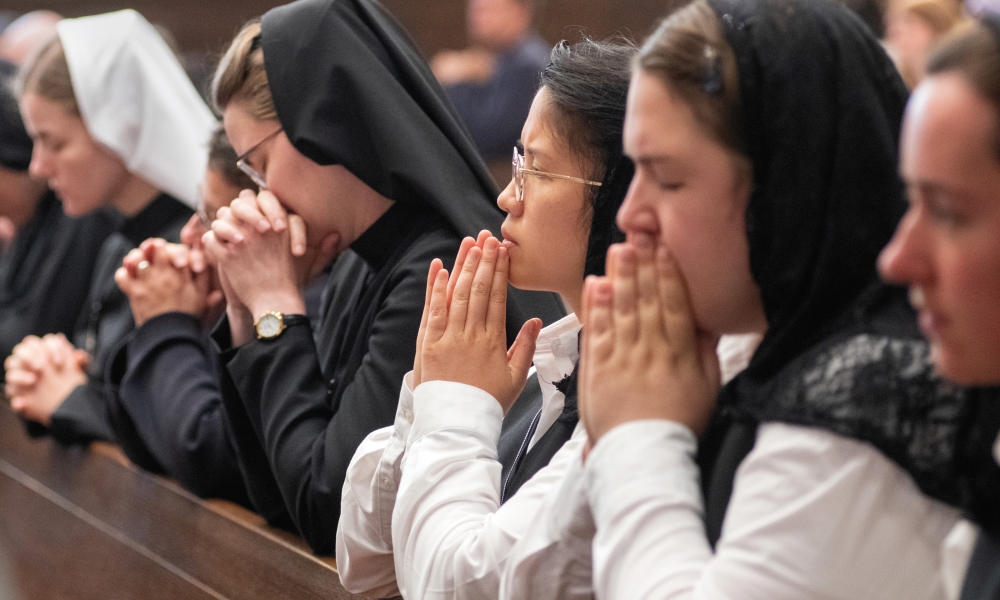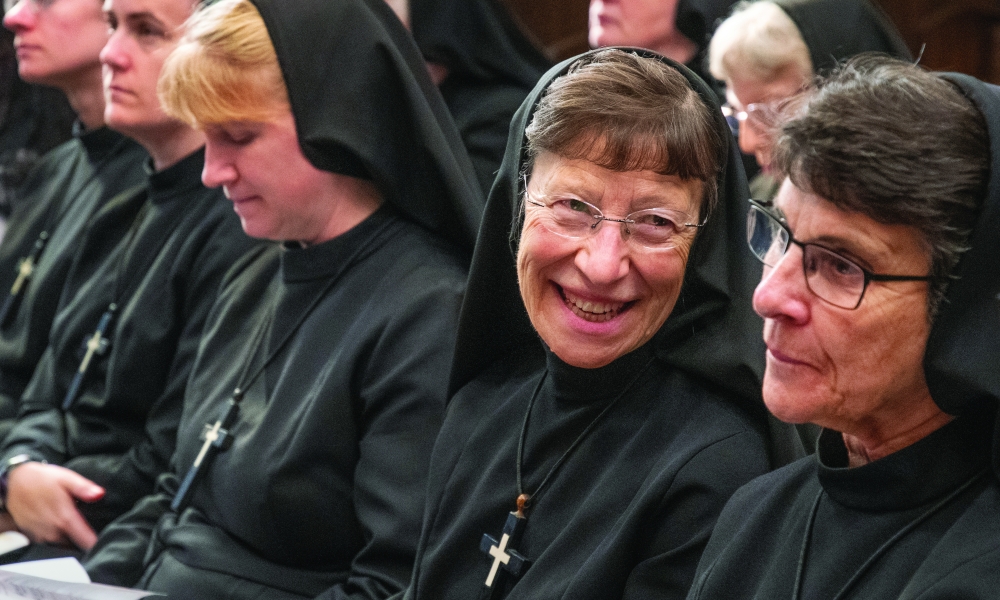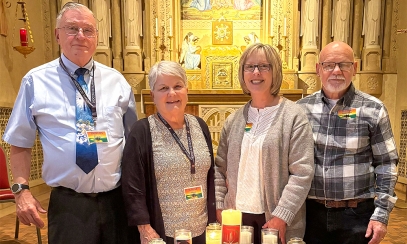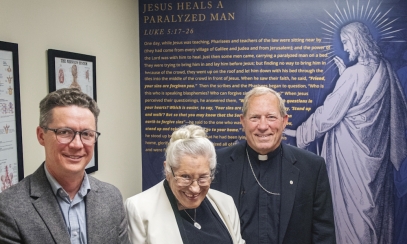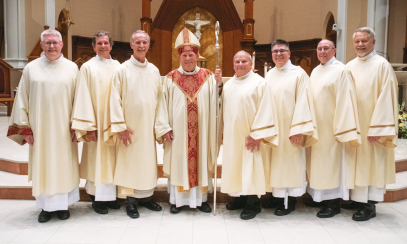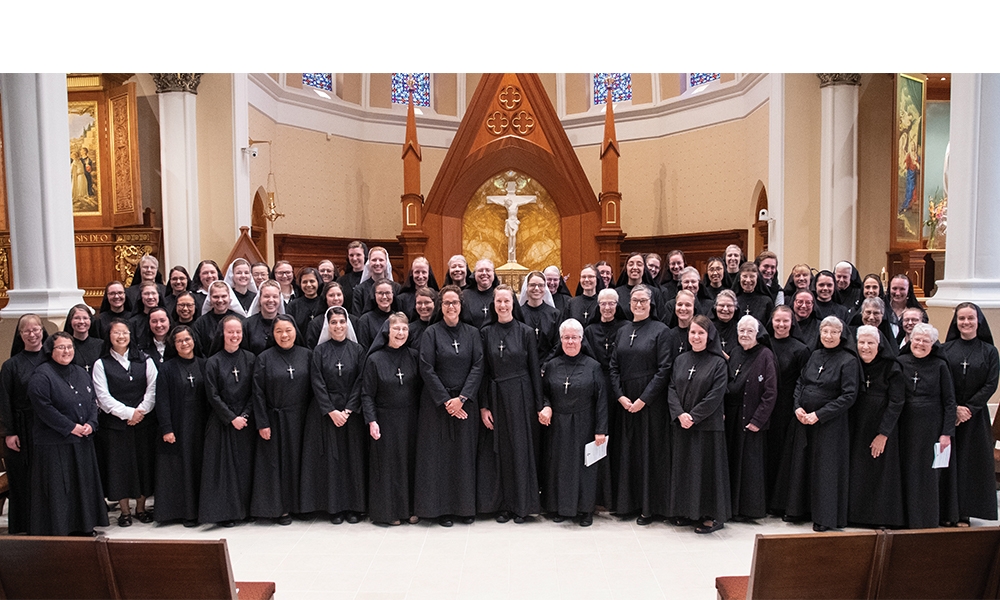
Sisters of Mercy of Alma celebrate 50th anniversary
Half a century old, the Institute looks to the future with hope
Half a century old, the Institute looks to the future with hope
Mother Mary McGreevy remembers when there were just 10 sisters living on a farm in Kawkawlin before they moved to their motherhouse in Alma.
Mother Mary McGreevy remembers when there were just 10 sisters living on a farm in Kawkawlin before they moved to their motherhouse in Alma.
The former superior general of the Sisters of Mercy of Alma recalls the leap of faith they took when Church authorities in Rome decided it would be best if the sisters formed their own institute—distinct from the Sisters of Mercy, Detroit, where they completed their formation.
Post-Vatican II was a time of tremendous change within the Church, and sisters all over the world were invited to seek renewal in religious life. In this spirit, the small group of Sisters of Mercy— later recognized as the Religious Sisters of Mercy of Alma— began their faith-filled journey, moved to Grand Rapids and began working in and operating St. Mary’s Hospital.
Separated from the larger community, the small group of sisters decided they wanted to live in the manner of their original foundress, Venerable Catherine McAuley, and they wanted to pray and live in community. To meet current needs, the sisters also wanted to make sure they were educated. They sought the assistance of Rome’s Congregation for Religious and Secular Institutes, now known as the Dicastery for Institutes of Consecrated Life and Societies of Apostolic Life.
Eventually, Church authorities granted permission to the small group of sisters to move from the hospital to the unoccupied farmhouse in Kawkawlin. While there, they worked in various healthcare positions in the community.
“Guided every step of the way”
Mother Mary still remembers the day—Sept. 1, 1973—when the separation became official and the Sisters of Mercy of Alma became its own institute.
Father Basil Heiser, a Franciscan priest, hand-delivered the paperwork and good news from the Congregation to the farm. Bishop Francis Reh then invited the sisters to locate in the Diocese of Saginaw and suggested Alma as a good place for the motherhouse.
Challenged by the Church in its early years, Mother Mary said they learned from their mistakes and “were guided every step of the way.”
From the beginning, Mother Mary said, they were asked whether they would be obedient and do what we were told, “and we said ‘yes.’”
“By God’s grace,” Mother Mary said, “here we are, 50 years later. … What we’re celebrating is God’s blessing. … It’s a miracle.”
Now, the Institute has 110 sisters all over the world, primarily working in education and healthcare. While most of their convents are in the United States, the Institute also has convents in Rome, Scotland, Germany and Australia. And despite geographical distance, the sisters are a tight-knit community—a “religious family.”
Celebrating as a community
To help the Institute celebrate its 50th anniversary this year, Mother Mary requested permission from Rome for a plenary indulgence. That indulgence, granted last August, will be in place from Sept. 1, 2023 to Sept. 1, 2024 and will allow members of the public to celebrate the Institute’s anniversary with the sisters.
“It’s a way of relating to the larger community of the faithful,” Mother Mary said.
Throughout the year, the faithful will have the opportunity to participate in prayer at each of the local convents. They will be able to gain the plenary indulgence “as pilgrims who devoutly take part in the rites of the jubilee celebrations” by visiting the motherhouse chapel in Alma or a chapel connected with one of the Sisters of Mercy of Alma communities during certain hours. According to the decree issued by Rome, those participating must “... for a reasonable period of time, engage in pious reflections, concluding with a recitation of the Creed, the Our Father, and petitions to the Blessed Virgin Mary (e.g. the Hail Mary).”
The yearlong celebration and plenary indulgence will be a way to pray to “remember well what has gone before, to mark it well, and to reflect together on our history,” Mother Mary said.
A future full of hope
Looking ahead to the next 50 years, the sisters are full of hope.
Sister Mary Judith O’Brien, chancellor for the Diocese of Saginaw and vicar-general of the Sisters of Mercy of Alma, said for the first years of existence of the Institute, the sisters were busily earning their degrees at colleges and universities to work in different fields, primarily healthcare and education.
The Dublin-born foundress of the Sisters of Mercy, Venerable Catherine McAuley, who is now on the path to sainthood, did not want the sisters to be monastic and stay to themselves. Instead, she encouraged them to take to the streets as “walking nuns” to help the sick and the poor.
In the same spirit, now that more Sisters of Mercy of Alma have earned their degrees, they are better able to help the communities where they are located. It is their aim to do their best in the communities where they are located to reach out to the poor and needy—just like Venerable Catherine McAuley and the original Sisters of Mercy did in Ireland nearly 200 years ago.
The question for the sisters is always: “Where can we give where no one else is really serving?” Sister Mary Judith said.
Looking into the future, Mother Mary McGreevy hopes that the Institute can make further contributions to education and healthcare in service of the poor near and far.
In the Diocese of Saginaw, the sisters already own and operate the Sacred Heart Mercy Healthcare Center, which provides healthcare to people in Alma and surrounding areas.
Among the sisters residing in the Saginaw convent, one, Sister Mary Rebecca Koterba, M.D., is the executive director of Catholic Family Service. The agency is an affiliate of the diocese with offices in Saginaw and Bay City, offering counseling and guardianship services.
Another, Sister Maria José Perez, is the assistant principal for All Saints Middle School and High School in Bay City.
The sisters are actively working to make a difference outside the Diocese of Saginaw, too.
For example, three sisters serve as physicians at the Family Health Center at Cristo Rey Community Center, one of the Catholic Charities Agencies in the Diocese of Lansing that assists the homeless and vulnerable families.
Despite being in five countries on three continents, the sisters still manage to remain in close contact via Zoom, annual retreats and, of course, prayer.
Prayer is at the center of everything the sisters do, Sister Mary Judith said. “Our prayer life is essential. … We all follow the same schedule of prayer.”
There may be work demands and slight schedule variations, but as much as possible, the sisters all over the world try to pray as one community—together at the same time, she explained.
Three times a day, the sisters pray the daily prayer of the Church called the Divine Office, also known as the Liturgy of the Hours. Beginning at 5:30 a.m., the sisters pray Lauds (morning prayer), followed by meditation and Mass. They meet again in prayer at 5:30 p.m. for a Holy Hour, which includes the Rosary and Vespers (evening prayer). The final office, Compline (night prayer), is prayed together around 8:30 p.m. On Sundays, the Sisters have Adoration throughout the day—from after Mass until Holy Hour in the evening.
“Prayer is our first obligation,” said Sister Mary Judith. “The glue is prayer.”
Vatican grants plenary indulgence in celebration of jubilee year
The plenary indulgence may be received between Sept. 1, 2023, and Sept. 24, 2024, in visiting the chapels of the local convent.
- Our Lady of Grace Education Center Chapel, 1965 Michigan Avenue, Alma Sundays: Noon to 5 p.m. Holy Hour at 4 p.m. To visit at another time email almaconvent@gmail.com or call 989.463.6035 ext. 1
- Sacred Heart Mercy Health Care Center Chapel, 2025 West Cheesman Road, Alma Monday through Thursday (except major holidays): 8 a.m. to 5 p.m.
- St. Dominic Chapel, 705 Hoyt Avenue, Saginaw Thursdays from 9 a.m. to 8 p.m, during Exposition of the Blessed Sacrament To visit at another time, email RSMSaginaw@gmail.com
To receive a plenary indulgence, the regular conditions should be met. These are sacramentally confessing one’s sins, receiving Holy Communion, being detached from sin and praying for the intentions of the Holy Father.

